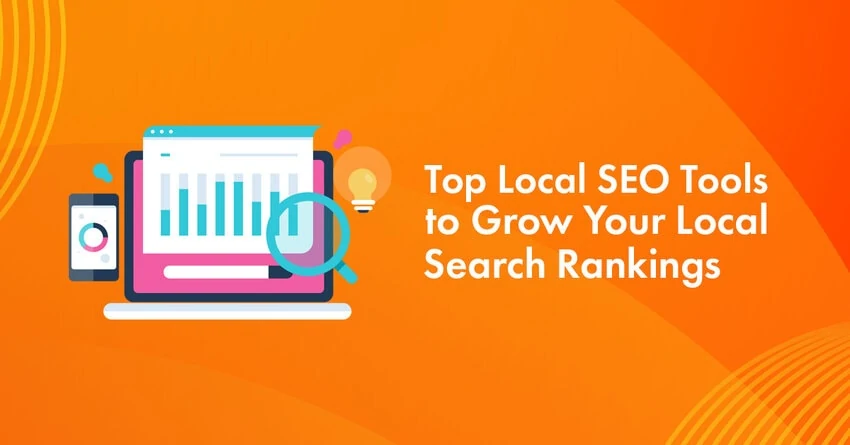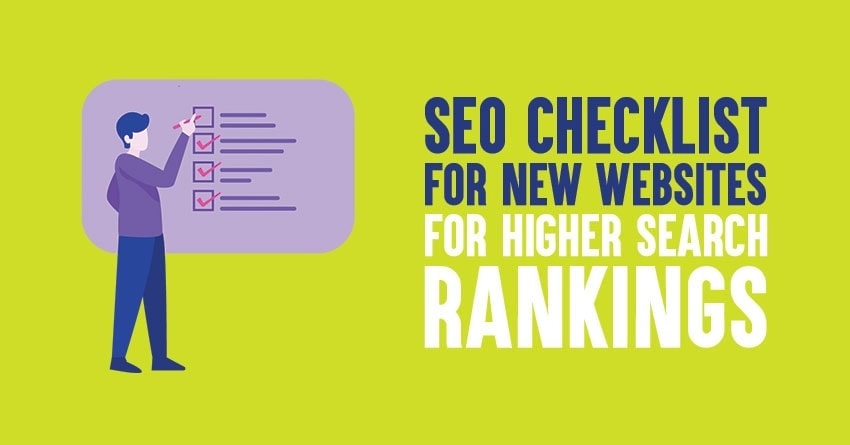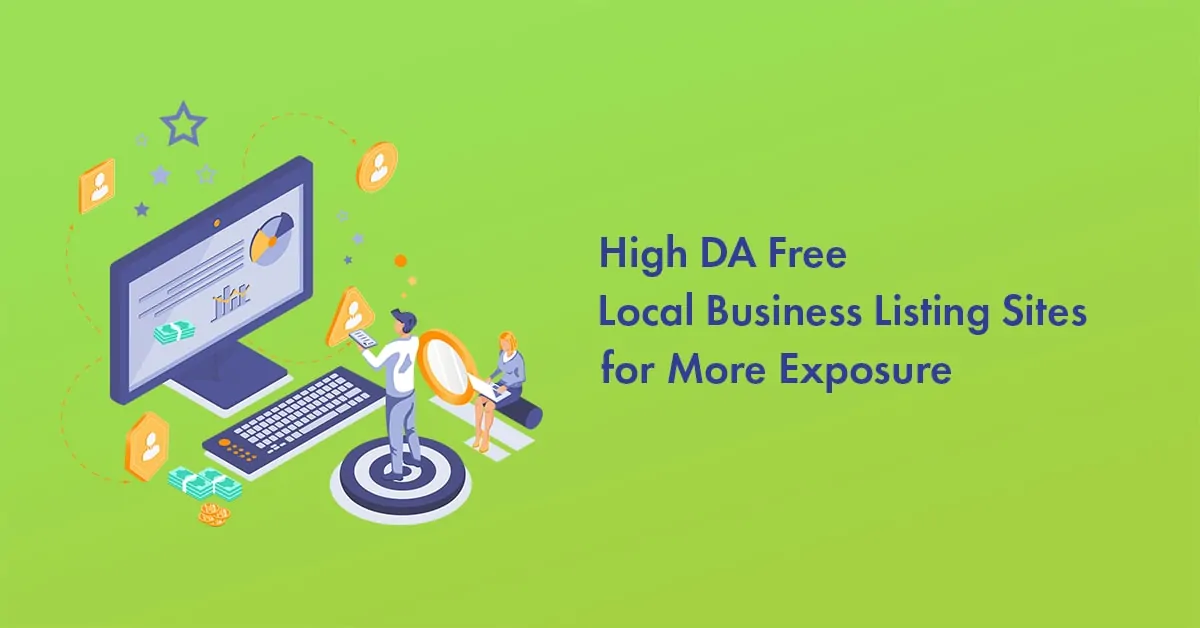Did you know that 46% of Google searches are local? Over 50% of “near me” searches result in a physical store visit, out of which 26% of visits result in a purchase.
That’s why local SEO is important if you’re running a physical store.
Local SEO is optimizing your business to be more visible in local search results on search engines like Google. You’ll rely on many local SEO tactics, like local content, customer reviews, social profile pages, backlinks, etc., to boost your local rankings.
If you’re looking for a handy local SEO checklist to boost your visibility, this post is just for you. Let’s jump into the details.
Table of Contents ☰
The Complete Local SEO Checklist for 2024

1. Claim your local business online
The FIRST thing you need to do is to claim your business on online platforms, including;
- Google Business Profile
- Yelp
All the platforms allow you to create your business listing for FREE. Provide all your business details, including;
- Name of your business (use relevant keywords related to your products or services)
- Physical address of your business
- Phone number
- Website URL
- Email contact information, etc
The BIGGEST benefit of claiming your local business online is that it will be listed in search engine results pages (SERPs) and local directories. It simply means that more people will be able to find your business when they search for products or services like yours in your area.
Here’s an example of a local business listing on Google Business;

As you can see, local business listings will show up with your store location, address, etc, when someone searches for your business on Google.
So, get those listings on all major platforms to let people easily find your physical store. Another advantage of these listings is that you can interact with customers directly through your listing.
Make sure to encourage customers to leave reviews.
The more positive reviews your business has, the more potential customers will visit in person. So, encourage your customers to leave reviews by offering discounts or other incentives.
Important: No matter where you list your business online, make sure to use the same name, address, and phone number (NAP) on all of your listings.
2. Find local SEO keywords
In SEO, keyword research is important. When it comes to local SEO, local keywords play a MAJOR role.
You can’t ignore keyword research and optimization, especially if you want to get more visibility for your local business.
Local SEO keyword research is the process of finding LOCAL keywords that are location-specific. You can rank for the results related to the same geographic location by targeting local keywords.

So, how do you find local SEO keywords? Here are some PROVEN tips for you.
Create seed keywords: First, create a list of ALL the products and services that your business offers. Then, brainstorm a list of seed keywords. Seed keywords are words or phrases that you can use as the starting point in a keyword research process to find even more BETTER keywords.
For example, if your business is selling gold coins and bars, your seed keywords could be;
- gold coins
- buy gold coins
- sell gold coins
- gold coin investment
- gold coin prices
- gold coin types
- gold coin collections
- gold coin dealers
Once you’ve identified a list of HIGHLY relevant seed keywords for your local business, you can use them as modifiers to generate more keyword ideas.
Add Keyword Modifiers: Now, you want to modify your seed keywords with keyword modifiers that fall into the following categories:
- Location: Local, near me, online, worldwide
- Price: cheap, discount, affordable, premium
- Type: bullion, collectible, antique
- Weight: 1 ounce, 1/2 ounce, 1/4 ounce, 10 grams, 5 grams
- Purity: 24 karat, 22 karat, 18 karat, 14 karat
- Certification: PCGS, NGC, ANA, PMG
- Brand: American Gold Eagle, Canadian Gold Maple Leaf, South African Krugerrand, Australian Gold Kangaroo
Here’s a list of real-world examples of a local business selling gold coins;
- Location: local gold coin dealers near me
- Price: cheap 1 ounce gold coins
- Type: collectible gold coins for sale
- Weight: 1/2 ounce gold coins on sale
- Purity: 24 karat gold coins buy
- Certification: PCGS certified gold coins
- Brand: American Gold Eagle 1 ounce gold coins
See that? You can use those local SEO keywords to rank higher for local searches in your area.
Local SEO question keywords: Finally, you should also identify a list of all the questions that your potential customers may ask (in search engines like Google).
The examples of local SEO question-based keywords include;
- Where to buy gold coins near me?
- What is the best gold coin dealer in [city]?
- How much do gold coins cost in [state]?
- Where can I sell my gold coins in [country]?
You can use these question-based keywords to create content that answers your target audience’s most common questions.
You can use tools like Answer The Public or AlsoAsked.com to find question keywords related to your business.
3. Local Link Building For SEO
Link building is still relevant if you want to rank in Google.
Local link building is the process of building relevant links to your local business to improve its website’s authority and overall search rankings.
Link building is important because;
- Google gives MORE priority to websites with quality and relevant links. The higher the number of quality backlinks you have, the higher your website will rank.
- It helps attract high-quality visitors from search engines
- It improves your overall brand’s visibility online
Try to get your hands on these best local SEO tools, as they can help you save more time and money.

How can you get started on building backlinks for your local business? Here are a few proven ways.
Use local review websites: Local review websites are a great way to build links to your local business. The best part? Most of them are free to join. Here is a list of popular local review sites you can use:
- Yelp
- Google Business Profile
- Nextdoor
- Angie’s List
- Trustpilot
- Yellowbook
- HomeAdvisor
- Citysearch
Make sure to create a free account on these review sites and provide a detailed listing for your business, including your local business physical store address, phone number, website, etc.
Spy on your competitors’ backlinks: Spying on your competitor’s backlink profiles is one of the most powerful ways to build links to your local business.
Firstly, list all the competitors for your local business (who are already doing well online). Then, use a free tool like Ubersuggest to find their backlinks easily.
Here’s what it looks like;

As you can see above, you can easily discover the backlinks of ANY domain along with their sources.
Once you’ve identified the types of websites linking to your competitors, you can target them yourself in many ways, such as;
- Guest posting on those sites
- Broken link building
- Contacting those website owners for sponsored content (or purchase links)
- Email outreach
Get listed in local directories: A TON of online business directories allow you to list your business for free. Getting listed in these directories can help you improve your local SEO and reach a wider audience. Here are a few of such directories;
- Foursquare
- Manta
- Nextdoor
- Chamber of Commerce
- Angi
- Thumbtack
To list your local business on these directories, you need to create an account. You can visit their website and create a profile using your email. Then, make sure to include all of the relevant information about your business, such as your address, phone number, website, etc.
4. Optimize your website for mobile
Did you know that 80% of local mobile searches convert? That’s a huge number, right?
It just shows how important it is for local businesses to have a mobile-friendly website.
Here are a few tips for optimizing your website for mobile in 2024.
- Use a responsive website design. Having a responsive design means that your website will automatically adjust to fit the device’s screen size, whether it’s a smartphone, tablet, or laptop. You can use a wide range of WordPress themes for responsive design, including GeneratePress, Elegant Themes, Astra, etc.
- Always optimize your images. As a local business, you might be using a ton of images, but remember, large images can slow down your website’s loading time, and visitors are more likely to abandon a slow-loading site. Make sure your images are in the right size for mobile devices. Enable image lazyloading, use a CDN, etc.
- Use large, easy-to-read fonts. Use a font size of at least 16 to 18 pixels, as small fonts can be difficult to read on a small screen.
- Make your navigation easy to use. Avoid using too many drop-down menus or small buttons, especially for mobile visitors. They can make it difficult for them to go through your content or products.
- Lastly, avoid using popups. If you’re using popups for conversions on your website, at least turn them off for mobile users, as intrusive popups can lead to a bad user experience.
Also, focus MORE on your website page loading times, as people will leave your site if it takes TOO long.
You can use free tools like Google PageSpeed Insights to see how fast your website loads. The best part? It also suggests which elements to improve your page loading times.
5. Get customer reviews for your local business
According to Finance Online, 90% of brands found that online reviews impacted local rankings.
All the major business listing sites, including Google Business, Facebook, Yelp, etc., give TOP priority to customer reviews.
Customer reviews are important for local SEO because they are a POSITIVE signal to Google that your business is trustworthy.
Another BIG reason? When people want to purchase something from a local business, they often read reviews online to see what other customers say.
If your business has a lot of positive reviews, it is more likely that people will buy from you over your competitors. So, don’t ignore customer reviews if you want to boost your organic traffic and overall sales.
Here are some PROVEN tips to get customer reviews for your local business.
Ask for reviews: The best to get more reviews for your business is to ask for them. There are many ways to ask for customer reviews, including;
- Asking in person
- Over the phone
- Via email
If someone visits your physical store, make sure to help them buy what they want. Listen to their needs and budget. Once the purchase is done, ask them to leave a review. Once done, be sure to thank customers for their time and feedback.
Make it easy: Make it extremely easy for your customers to leave reviews. Nobody likes to spend a minute reviewing a business. It should be seamless and should take less than a minute.
Here are some effective ways to do that;
- Include links to your business listing profiles on your website and social media pages.
- Use QR codes on your marketing materials or receipts so customers can scan them to leave a review. Offer a special discount for those who leave a positive review.
- Promote your Google Business listing profile, as leaving a review or customer rating on it is extremely easy and simple.
Offer freebies or incentives: Do you know why many NEW businesses offer incentives, such as discounts or freebies? It’s because they want MORE reviews from their customers. Think creatively and offer something special to those who leave a review.
Above all, respond to ALL the reviews, both positive and negative. That’s how you build a community and following around your local business.
Also Read: How Do Google Reviews Contribute in SEO
A handy local SEO checklist
Here’s a quick local SEO checklist for businesses looking to grow their organic traffic and sales.
- Create a Google Business account and also claim your business in local listing sites and directories.
- Make sure to create a website for your local business and ensure it is mobile-friendly, as 50% of local searches come from mobile devices.
- Target the RIGHT keywords for your business and use them throughout your home page and product pages.
- Get reviews from customers, as they’re positive signals in the eyes of Google.
- Build links to your website from other local websites. Try HARO, guest blogging, influencer marketing, etc.
- Invest in proper SEO tools. You can try tools like Semrush, which gives you access to over 55 tools under one roof, and it can help you with keyword research, competitor analysis, backlink audits, and much more.
- Run local ads by targeting geo-specific keywords. Ads are the fastest way to reach your target customers.
FAQs on small business SEO checklist
Here are some of the FAQs on local SEO.
Local SEO (search engine optimization) is the process of improving the visibility and ranking of a local business in search results, especially for searches that are relevant to the business’s location.
Local SEO is important for local businesses because it can help them attract more visitors to their websites and improve their sales. When a local business ranks higher in Google, you’re more likely to improve your overall sales.
Some of the local SEO best practices are;
– Listing your business on sites like Google Business, Yelp, etc
– Encouraging customer reviews online
– Targeting local keywords
– Optimizing for voice searches
Yes, search engines like Google and business listing sites like Google Business, Yelp, etc consider user reviews while ranking a local business site. Positive reviews can help you improve your overall search rankings and attract more customers.
Optimize your image sizes. Large-sized images can slow down your website’s loading time. Make sure your images are compressed and properly sized for mobile devices. Many plugins like TinyPNG can automatically optimize the size of your images.
Related Posts:
- Step By Step SEO Tutorial For Beginners to Use In 2024
- 10 Point SEO Checklist for New Websites for Higher Search Rankings
- Top 10 Local SEO Tips to Get #1 Rankings On Google
Final thoughts on local SEO tasks
Local SEO is ALL about attracting more customers to your business.
Fortunately, there are a lot of tools available (such as Semrush, Ahrefs or Moz) that can help you with local SEO keyword research, link building, content creation, etc.
So, what do you think about local search engine optimization? Have any questions? Let us know your thoughts in the comments.



